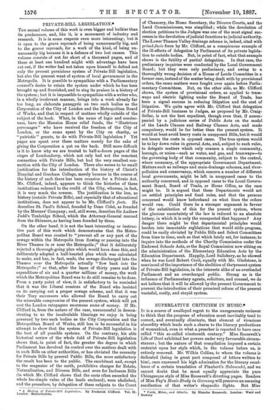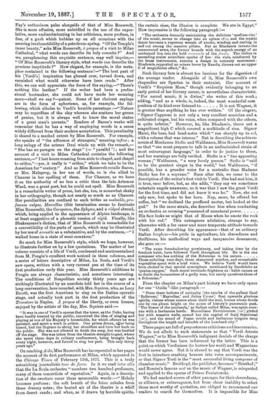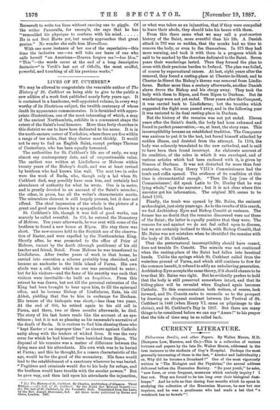SUPERLATIVE CRITICISM DT MUSIC.* Ix is a source of unalloyed
regret to the unregenerate reviewer to think that the progress of education must inevitably tend to correct, and eventually eliminate, that element of vivacious absurdity which lends such a charm to the literary productions of womankind, even in what a preacher is reported to have once called " this so-called nineteenth century." Miss Roosevelt's Life of Dord exhibited her powers under very favourable circum- stances; but the nature of that compilation imposed a certain restraint upon her style which, in the volume before us, is entirely removed. Mr. Wilkie Collins, to whom the volume is dedicated (being in great part composed of letters written to him), once expressed his high admiration for the literary excel- lence of a certain translation of Flaubert's Salammbo, and we cannot doubt that he must equally appreciate the pure Chicagesque style of Miss Roosevelt's diverting pages. Readers of Miss Fay's Music-Study in Germany will preserve an amusing recollection of that writer's rhapsodic flights. But Miss
• Verdi, Milan, and Othello. By Blanche Roosevelt. London: Ward and Downey
Fay's enthusiasm pales alongside of that of Miss Roosevelt. She is more effusive, more unbridled in the use of the super- lative, more undiscriminating in her criticisms, more profuse, in fine, of a gush which babbles up on all occasions with the seeming inexhaustibility of a petroleum.spring. "Of the Temple's inner beauty," asks Miss Roosevelt, a propos of a visit to Milan Cathedral, " what words can describe its holy conceits 7" And we, paraphrasing this exquisite sentence, may well inquire,— "Of Miss Roosevelt's literary style, what words can describe the precious ineptitude 7" How elegant, for example, is the meta- phor contained in the following sentence !—" The best part of his [Verdi's] inspiration has glossed over, turned down, and varnished what would otherwise have been crude." After this, we can well appreciate the force of the saying,—" There's nothing like leather." If the writer had been a profes- aional bootmaker, she could not have made her meaning more—shall we say P—patent. Some of her choicest sayings are in the form of aphorisms, as, for example, the fol- lowing, which alludes to Verdi's humble parentage a—" Nature may be regardless of the clay whereon she scatters her germs of genius, but it is always well to know the moral status of a great man's parents." Readers of Bacon's works will remember that he has a way of employing words in a sense widely different from their modern acceptation. This peculiarity 78 shared to a marked extent by Miss Roosevelt. For example, she speaks of "the affluence of strangers," meaning influx; a long eulogy of the actress Dag winds up with the remark,- " She has no paragon on the stage" (=. " parallel ") ; and the account of a visit to Milan Cathedral contains the following sentence,—" I lost hours roaming from aisle to chapel, and chapel to orifice,"—yes, it really is "orifice," which we take to be the American for "oratory." And as Miss Roosevelt recalls Bacon, or Mrs. Malaprop, in her use of words, so is she allied to Chaucer in her spelling of them. For Chaucer, as we have it on the authority of no less a critic than the late Artemus Ward, was a great poet, but he could not spell. Miss Roosevelt is a remarkable writer of prose, but she, too, is somewhat shaky in her orthography, though not nearly so much so as Chaucer. Her peculiarities are confined to such trifles as malealde, pro- fansm vulgas, lifarcellas (this termination seems to fascinate Miss Roosevelt), the Cerapeum, the Sphyno, and a ridged shroud, which, being applied to the appearance of Alpine landscape, is at least suggestive of a phonetic version of rigid. Finally, like Shakespeare's diction, that of Miss Roosevelt is remarkable for a convertibility of the parts of speech, which may be illustrated by her use of acoustic as a substantive, and by the sentence,—" I walked home in a state of semi-comatose."
So much for Miss Roosevelt's style, which we hope, however, to illustrate further on by a few quotations. The matter of her volume consists of a life of Verdi, condensed and sentimentalised from M. Pougin's excellent work noticed in these columns, and a series of letters descriptive of Milan, La Scala, and Verdi's new opera, written with a very current pen at the time of its first production early this year. Miss Roosevelt's additions to Pongin are always characteristic, and sometimes interesting. The conditions of Neapolitan society thirty years ago are strikingly illustrated by an anecdote told her in the course of a long conversation, here recorded, with Mrs. Squires, who, as Lucy Escott, was the first American to sing on the Italian operatic stage, and actually took part in the first production of the Trovatore in Naples. A. propos of the liberty, or even license, enjoyed by the artists of the day, Mrs. Squires said a- " It was in one of Verdi's operas that the tenor, as the Duke, having been hardly treated by the public, conceived the idea of singing and playing at one of his Majesty's households, for which offence he was arrested, and spent a week in prison. One prima donna, after being hissed, had the ill-grace to shrug her shoulders and turn her back on the public. She was not allowed to finish the song, but was hustled off the stage. She was taken from the theatre straight to gaol, where she spent three days in solitary confinement, being brought back every night, however, and forced to sing her part. This only thirty
years ago."
On reaching Aida, Mies Roosevelt has incorporated in her pages the account of its first performance at Milan, which appeared in the Chicago Times of February 11th, 1871. This is a truly astonishing journalistic tour de force. In it we read inter alia that the La Scala orchestra " numbers two hundred professors, many of them concertiste of reputation." Again, in a descrip- tion of the overture occur these memorable words Melody 'becomes perfume ; the soft breath of the lotus exhales from these dreamy notes; the heated air of the theatre is a whiff from desert sands; and when, as if drawn by horrible spirits, the curtain rises, the illusion is complete. We are in Egypt." How impressive is the following paragraph !—
" The orchestra dreamily maintaining the delicious ' medium-tint' of the music, seems to change into an opium reve, and the mystic dance becomes a vaporous wreath of smoke, winding and curling is and out among the massive pillars. But as Rhadamis invests the consecrated arms, the former bounds with the superb energy of an unchained lion into the bold crescendo of the finale. The violins in ascending scales scintillate sparks of fire the viols, reinforced by the brass instruments, execute a design in contrary movement Rhadamie, supported an octave lower by Remits, throws out an upper C of magnificent effect," ,he.
Such literary fare is almost too luscious for the digestion of the average reader. Alongside of it, Miss Roosevelt's own rhapsodies are Spartan in their restraint. Her account of Verdi's "Requiem Mass," though evidently belonging to an early period of her literary career, is nevertheless characteristic. "For sacred music, it is divine," she writes of this work ; adding, " and as a whole, is, indeed, the most wonderful corn position of its kind ever listened to It is not Wagner, it is greater than anything he has ever written." Of the singers, " Signor Capproni is not only a very excellent musician and a cultivated singer, but his voice, when compared with the others, is quite inferior." However, he, like Rhadamis, threw out a magnificent high C which covered a multitude of sins. Signor Maini, the base, bad head-notes which " ran sharply up to sot, with a volume that was intense." Bat in describing the achieve- ments of Meedames Stoltz and Waldmann, Miss Roosevelt warns us that " one must prepare to talk in an undiminished strain of most extravagant language," in order to do justice to them, and her warnings are fully verified. Stoltz is a " fine appearing woman ;" Waldmann, "a very lovely person." Stoltz is "said to be the greatest singer in the world," but Waldmann, "if possible, has a grander voice for a contralto than Madame Stoltz has for a soprano." Soon after this, we come to the description of the writer's first visit to Verdi. She had met him, it is true, once before, bat, as she adds, " they say we sometimes entertain angels unawares; no it was that I saw the great Verdi for the first time, and did not know it was he." Now, she not only saw, but spoke to her hero. Nay, more, he offered her coffee, but " we declined the proffered nectar, but looked at the god." In the same strain, she describes him when conducting an orchestra as seeming "possessed of unnatural power His face looks as might that of Moses when he smote the rock with his rod." This outrageous adulation, strange to say, alternates with a far saner and more temperate attitude towards Verdi. After describing his appearance—that of an ordinary Italian borghese—his pride in agriculture, his shrewdness and thriftiness, his methodical ways and inexpensive demeanour, she goes on
:-
"The same foreshadowing persistency, and taking time by the forelock habit, have followed Verdi throughout life. He is the one
composer who has nothing of the Bohemian in his nature Those unfailing rent-days, those sharpened scythes, and remarkable vegetables speak with a loud voice. We believe Verdi would have been choked in that special atmosphere mentioned by Bandelaire as 'genius-oxygen.' Such moral rectitude frightens ne habit causes us to doubt the hexameters of a godly man, but rarely questions those of a Bohemian."
From the chapter on Milan's past history we have only space for one " Ouida "-like paragraph a —
" From these hollows of antiquity [the epochs of the gallant Gaul Belleveso," Marcellas: and Julius Caesar] float upwards glorious spirits, visions whose names alone thrill the soul, heroes whose deeds one by one gleam bright on the azure of history's panoramic past. The flower of the peninsula,' as Sallnst called Milan, was again over- run with a barbarous horde. Maxmiliano Herculaneum [sic] girded her with massive walls, named her the capital of Italy Septrional [sic], and the sound of Pagan revels and barbarous tongues rang throughout the length and breadth of the Lombard city."
These pages are full of preposterous criticisms and inaccuracies. We do not allude to such statements as that " Verdi detests Wagner," or to Miss Roosevelt's indignant denials of the charge that the former has been influenced by the latter. This is a point on which Verdiniane (to borrow her word) and Wagnerians would never agree. Bat it is absurd to say that Verdi was the first to introduce crashing brasses into voice accompaniments, or that Signor Toeti is the " most successful living composer of chamber.music." Breitkopf, the publisher, becomes" Briethof ;" and Rossini's famous mot on the music of Wagner, is misquoted and applied to the operas of Prince Poniatowski.
We had marked scores of other passages for their shrewdness, or silliness, or extravagance, but from sheer inability to select those most worthy of quotation, are obliged to recommend our readers to search for themselves. It is impossible for Miss Roosevelt to write ten lines without causing one to giggle. Of the writer Pascarella, for example, she says that he has "remoulded his physique to conform with his mind He is not Bret Harts yet, brit nearly approaches that great genius." No wonder she calls him Marvellous.
With one more instance of her use of the superlative—this time the inclusive use—we will take our leave of one who calls herself "an American—Heaven forgive ins !—bas bleu." " This "—the words occur at the end of a long descriptive fantasia—" is Verdi's last act of Othello, the most soulful, powerful, and touching of all his previous works."

























































 Previous page
Previous page